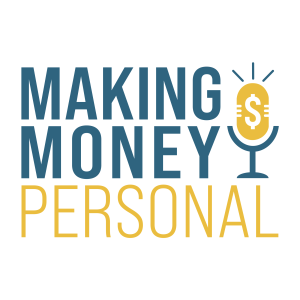Episodes

Tuesday Feb 18, 2025
The Dangers of Deep Fakes - Money Tip Tuesday
Tuesday Feb 18, 2025
Tuesday Feb 18, 2025
Artificial Intelligence, commonly known as AI, has permeated our way of life. It feels like every tech corporation is pushing their latest AI tool or feature to help make your life better. Unfortunately, with AI going mostly unchecked, it can easily become a detrimental tool for the wrong people. Deepfakes in particular can be manipulative and dangerous. Here’s what you need to know about deepfakes and how to combat them.
Links:
Report deepfakes with the Internet Crime Complaint Center
Check out TCU University for financial education tips and resources!
Follow us on Facebook, Instagram and Twitter!
Learn more about Triangle Credit Union
Transcript:
Welcome to Money Tip Tuesday from the Making Money Personal podcast.
If you don’t already know, deepfakes are videos, images, or audio of someone or something that has been altered by AI. These deepfakes can be used to portray a person doing something that they haven’t done and or wouldn’t have done. This can easily be a conduit to spread disinformation.
For example, deepfakes can be made of politicians to make it seem like they said something or did something, when in reality it was created by AI. The deepfake can make the politician say something that might be controversial or visually put the politician in a compromising position. This can be devasting to their campaign, especially if people believe it is real.
Similarly, celebrities have been mimicked by deep fakes. Some of it is innocent, such as de-aging an actor for a movie. However, celebrity deepfakes have been used to endorse products or politicians without the celebrity’s consent.
You don’t have to be famous to be a victim of deepfakes. If scammers can get a recording of your voice, they can make you say whatever they want with AI. They can then call people that you know and talk to them with your voice. Scammers use this technique to then scam your loved ones into thinking you’re in some kind of trouble and need money. Similarly to politicians and celebrities, your likeness can be recreated with deepfakes. If someone has images or videos of your face, they can make a deepfake of you doing whatever they want.
Fortunately, there are ways to decrease the likelihood of having a deepfake made of you, or at the very least make it more difficult for scammers to create one of you. Be careful with what you share online and who you share it with. Scammers need images, videos, or audio of you to create a deepfake. The more media they have of you, the easier it is to make a realistic deepfake. Only share your photos and videos with people you trust. If you use social media, limit who can see your posts. You can also watermark your media which makes it harder to make a deepfake and also makes it easier to trace who created it.
If you find deepfake content of yourself or someone you know, report it on the platform it’s hosted on. You should also report it to the Internet Crime Complaint Center. If you are the victim of a deepfake, you may want to consult legal counsel and find out what your next steps are.
If there are any other tips or topics you'd like us to cover, let us know at tcupodcast@trianglecu.org. Also, remember to like and follow our Making Money Personal Facebook and Instagram to share your thoughts. Finally, remember to look for our sponsor, Triangle Credit Union, on Facebook and LinkedIn.
Thanks for listening to today's Money Tip Tuesday. Check out our other tips and episodes on the Making Money Personal podcast.

Tuesday Feb 11, 2025
4 Ideas to Save Money on Valentine’s Day - Money Tip Tuesday
Tuesday Feb 11, 2025
Tuesday Feb 11, 2025
Valentine’s Day is when people show extra love and affection for a special person, but showing your love should not break the bank. With a little planning ahead and some creativity, you can easily find ways to enjoy this special holiday without blowing the budget.
Links:
Explore Triangle's Purchase Rewards programs to earn cash back on purchases at over 200 vendors
Check out TCU University for financial education tips and resources!
Follow us on Facebook, Instagram and Twitter!
Learn more about Triangle Credit Union
Transcript:
Celebrating holidays is exciting. There’s a lot of anticipation to show that special person in your life you care. But, holidays can bring expectations to spend, often for festive food, fun experiences, and special gifts. Valentine’s Day is no exception, and like many other holidays, it’s important to consider beforehand just how much we’re willing to spend.
If you plan to celebrate Valentine’s Day this year, here are four ideas to save money while still having a fun and romantic holiday.
1. Celebrate at Home
Avoid the long waits and high cost of a night out and spend the night celebrating at home.
If one of you knows your way around the kitchen, cooking dinner together is a great way to spend quality time together.
If you want a night off from cooking, getting food delivered or picking up food at a local restaurant and bringing it home is another option. However, make sure to order the food ahead of time, as wait times are sure to be longer than usual.
There are also fun but inexpensive activities that you can do at home with your loved one. You can play board games or card games, put together a puzzle, rent a movie you’ve been dying to see, or even follow a YouTube tutorial for your own paint night. Check out your local dollar stores and discount stores if you need supplies for these activities.
2. Make Your Gifts
Showing your love and appreciation for your special someone on Valentine’s Day does not need to involve flashy, expensive gifts that drain your bank account. Instead, tap into your creativity and make your gifts.
Want to give your significant other a bouquet of flowers? Instead of spending hundreds of dollars at a florist, look up tutorials on putting together a bouquet and then head to your local grocery store or farmers market to pick up the flowers you need. Not only will this cost a fraction of the price, but it will also mean more that you put in extra effort to make your person feel special.
If flowers aren’t your thing, consider other DIY kits and ideas, such as a candle-making kit, a photo album or decorated photo frame, a custom playlist with songs that remind you of them, etc.
3. Utilize Gift Cards
According to a Bankrate survey, 47% of adults had at least one unused gift card, store credit, or voucher in 2023, totaling an average of $187 per person. Don’t let your gift cards go to waste! Valentine’s Day is a great time to use any gift cards you may have lying around from Christmas, birthdays, anniversaries, etc. Even if your gift cards will not cover the full cost of your dinner or activity, it will help reduce the cost and save you some money.
4. Take Advantage of Rewards
Like gift cards, many credit card holders do not use their rewards year after year. Leaving accumulated card rewards unused can feel like throwing away free money.
In some instances, it makes sense to build up your points for a more specific, high-value reward such as a hotel room or flight, but if you don’t have any travel plans soon, it might make more sense to redeem your points for something else. Look at your credit card’s rewards center and see what retail stores or restaurants you can redeem your points at.
Credit cards are not the only cards that offer rewards. Your Triangle Credit Union debit card gives you access to Purchase Rewards. With Purchase Rewards, you have access to special offers from over 200 retailers, unlimited cash back deposited each month for the rewards earned the previous month, and easy access to activate and view your rewards through online and mobile banking.
Don’t let Valentine’s Day blow your budget. Consider cutting back on costs this year and taking advantage of these low-cost date ideas.
If there are any other tips or topics you would like us to cover, let us know at tcupodcast@trianglecu.org. Like and follow our Making Money Personal FB and IG page and look for our sponsor, Triangle Credit Union on social media to share your thoughts.
Thanks for listening to today’s Money Tip Tuesday and check out our other tips and episodes on the Making Money Personal podcast.
Have a great day!

Tuesday Feb 04, 2025
Get Your Car Winter Ready - Money Tip Tuesday
Tuesday Feb 04, 2025
Tuesday Feb 04, 2025
While falling snow may look pretty, it can also be pretty dangerous for drivers. Winterizing your vehicle is a good precaution as it can save you money on car repairs and help you stay safe while on the road. If you own a car, here are some tips to get it winter-proof if you haven't already.
Links:
Visit our Auto page to explore current rates and learn more about GAP and MRC coverage for your vehicle
Check out TCU University for financial education tips and resources!
Follow us on Facebook, Instagram and Twitter!
Learn more about Triangle Credit Union
Transcript:
Welcome to Money Tip Tuesday from the Making Money Personal podcast.
Roads often become slippery during the winter months. To counteract this, consider putting winter tires on your vehicle. You can use all-season tires during the winter, but when it gets cold, the rubber in these tires hardens, decreasing the grip on the road. Winter tires use a special compound that can resist the cold and won't harden. Winter tires also have better traction in snowy and icy road conditions, which means that they have better acceleration and are better at stopping than all-season tires.
However, winter tires can be costly. Winter tires can cost over $600, plus you'll have to pay for the tire-swapping fees unless you do it yourself. A cheap alternative is putting chains on your tires to help with traction.
Regardless of what tires your car has, you'll want to check the tire pressure. Tire pressures drop 1 pound per square inch, or PSI for short, every 10 degrees Fahrenheit. You can check the correct tire pressure for your car in the manual or on the car door jamb.
Another way to get your car winter-ready is to have the battery tested. Your car battery is essential for starting your car. Colder temperatures can affect the chemicals in the battery, which may result in a car having trouble starting or not starting at all. Consider buying a portable jump starter for your vehicle in case your car doesn't start due to low temperatures.
Next, you'll want to make sure you have good visibility while driving. Check your windshield wipers to see if they are working properly, and don't leave smudge marks on your windshield. Fill up your windshield wiper fluid too. You can also get a hydrophobic repellant to add to your windshield, making scraping ice and snow off your car windows easier.
Headlights are another thing to consider when winterizing your car. Snow can cause limited visibility when driving, but having a good set of headlights can help you see better, especially during the dark hours of winter. If you've noticed that your headlights aren't as bright as they used to be, you should get a headlight restoration kit or replace them altogether.
You should have a winter emergency kit in your car. If you get stranded with your vehicle, this kit will help you get back on your drive or at least keep you comfortable while waiting for help to arrive. In this kit, you should include a snow shovel, a snow broom, an ice scraper, a portable jump starter, warm clothing, including hats and gloves, blankets, a first-aid kit, a basic tool kit, traction mats, and flashlights.
If you're considering buying a car that's more suitable for winter, look for one that has 4-wheel drive or all-wheel drive instead of front-wheel drive. Vehicles with 4-wheel drive and all-wheel drive provide better traction on icy roads than front-wheel drive vehicles.
If you decide to buy a more winter-proof car, Triangle Credit Union offers auto loans tailored to fit your ride. If you get into an accident, Guaranteed Asset Coverage, or GAP coverage, is designed to reduce or eliminate the difference between the insurance settlement and the loan balance. This protects you from owing more than the vehicle is worth. Mechanical Repair Coverage, or MRC, can help limit unexpected, covered repairs as your vehicle ages, potentially saving you thousands of dollars. If you’re interested in either one of these coverages, contact the credit union or visit your local branch to learn more.
If there are any other tips or topics you'd like us to cover, let us know at tcupodcast@trianglecu.org. Also, remember to like and follow our Making Money Personal Facebook and Instagram to share your thoughts. Finally, remember to look for our sponsor, Triangle Credit Union, on Facebook and LinkedIn.
Thanks for listening to today's Money Tip Tuesday. Check out our other tips and episodes on the Making Money Personal podcast.

Thursday Jan 30, 2025
Thursday Jan 30, 2025
Maintaining digital security is vital, whether you're an individual using your computer or phone or a business using organized networks and complex systems. The sad reality is that threats exist across the vast digital environment that every one of us should be taking steps to avoid.
In this episode, we're chatting with Chris Conway, owner of CEJ technologies, and security expert, about the many dangers cyber threats impose on all digital users and what kinds of systems and safeguards we can incorporate to protect ourselves and our devices.
Links:
Learn more about CEJ Technologies: 395 Daniel Webster Highway, Merrimack, NH CEJ Technologies
Contact Chris or his team at: 603-424-3117
Check out TCU University for financial education tips and resources!
Follow us on Facebook, Instagram and Twitter!
Learn more about Triangle Credit Union

Tuesday Jan 28, 2025
Protect Your Identity This National Data Privacy Day - Money Tip Tuesday
Tuesday Jan 28, 2025
Tuesday Jan 28, 2025
It’s national data privacy day! What better day to focus your attention on keeping your data secure than now. Take a couple of moments today and throughout the week to evaluate and safeguard your identity so you can effectively protect yourself from current or future threats.
Links:
Check out resources from the National Cybersecurity Alliance and the Cybersecurity & Infrastructure Security Agency
Learn more about the features and benefits of a Better Checking Account with IDProtect
Register or log into our Better Checking portal to access the credit score tracker, credit report and other account benefits
Transcript:
Welcome to Money Tip Tuesday from the Making Money Personal podcast.
One of the most important things you can do for yourself is to take identity and privacy threats seriously. There are new breaches occurring every day that choosing to not take steps for proper security could be costly. It's critical to put guards in place before any threat arises.
If you use digital services, tools and technology, National Privacy Day, and Week, is a great time to assess your existing security protocols and determine whether you’re adequately protected.
With fraud threats everywhere, it’s important to remember to stay on top of current scams to keep your privacy secure. Familiarize yourself with common tactics scammers use to trick you as well as stay abreast of new tactics arising. Check out the National Cybersecurity Alliance at Stay Safe Online for up to date information and resources about proper cyber protection. You can also explore resources and tools from the Cyber Security and Infrastructure Security Agency at CISA.gov.
Other, more active steps to take involve reviewing your current situation and identifying any areas where security could be improved.
Ensure all account passwords are secure, that you have proper PIN or biometric authentication on all devices and that all have been maintained with the most recent updates.
Monitor all your credit and credit card information. Make sure you’re paying attention to all your credit cards and have sufficient access to card controls to easily turn them off if they’re lost or stolen. Set up notifications for immediate awareness any time your cards are used. Receiving a simple message on card usage gives you the ability to act immediately if a suspicious charge occurs.
Keep an eye on your credit score for any inconsistencies or anomalies. Familiarize yourself by checking your score and viewing your current credit report. Your credit report will list out all your open credit lines, loans and other information like credit inquiries, payment history and other personal data regarding your credit activity. Look over the report to ensure all the activity is legitimate and accurate.
Finally, consider identity theft protection. Having identity theft protection offers benefits that help prevent fraud as well as cover you in case fraud occurs. These services monitor data bases and the dark web for sensitive information that way if any issue arises, you can act swiftly to resolve any issues. They also offer expense reimbursement, case managers and recovery assistance to help all throughout the recovery process.
With a Triangle Better Checking account you can get affordable access to amazing identity theft protection benefits for a small monthly fee of $4.99. With this one account you’ll gain access to identity theft monitoring, reimbursement coverage, a credit score tracker, credit reporting, card registration as well as reimbursement coverage and full service identity recovery with a case manager if you ever become a victim. To learn more about the benefits and for further account information, visit trianglecu.org.
If you already have a Better Checking account you’re already enrolled in the protection service but to access the other great benefits register at betterchecking.trianglecu.org to get started there.
If keeping your identity and sensitive information is high on your priority list, take some time today or throughout the week to set up additional protections for your devices and identity.
If there are any other tips or topics you would like us to cover, let us know at tcupodcast@trianglecu.org. Like and follow our Making Money Personal FB and IG page and look for our sponsor, Triangle Credit Union on social media to share your thoughts.
Thanks for listening to today’s Money Tip Tuesday and check out our other tips and episodes on the Making Money Personal podcast.
Have a great day!

Tuesday Jan 21, 2025
Check Your Financial Fitness with a Financial Assessment - Money Tip Tuesday
Tuesday Jan 21, 2025
Tuesday Jan 21, 2025
It's a new year, and for many, that means new year's resolutions. One of the most common resolutions is to get physically fit and healthy by working out. Another common resolution is to save money and take control of your finances. In this tip, get ready to learn how to become financially fit.
Links:
Financial Wellness Experience assessment
Check out TCU University for financial education tips and resources!
Follow us on Facebook, Instagram and Twitter!
Learn more about Triangle Credit Union
Transcript:
Welcome to Money Tip Tuesday from the Making Money Personal podcast.
The first thing you should do to become financially fit is assess your overall financial objectives. What is your current lifestyle like, and what would you like it to be? How much money does that cost? Take everything into account, from eating out to vacations. This will help layout a financial road map to follow as you set strategic goals along the way.
Next, while assessing your finances, compare your monthly expenses to your monthly income. Do you have money left over to save? If not, take a look at what you can cut from your expenses. To make it easier, create a budget that you can stick to. That way, you know exactly where your paycheck is going and what you can spend and what you can save. Not having enough money coming in to cover monthly expenses should be an obvious sign that your money needs closer management.
Just like physical fitness, financial fitness takes discipline. Achieving success won’t happen without planning or effort. For example, if your assessment reveals overwhelming debt, becoming financially fitter means it’s probably time to lower that debt. Through planning and discipline, take incremental steps to pay off the debts you’ve been carrying. Establish a payoff plan to either pay off the loans with lowest balances first or those with the highest interest rates first. If you can, pay more than the minimum amount owed monthly. Change your spending habits to stay on track. Don't borrow money if you won't be able to pay it off. Save the money you do have so you can buy the big-ticket items you want. Use loans for purchases that will increase in value, like real estate.
Saving your money is the next step in your financial fitness plan. If your assessment reveals lack of savings, either for short term like emergencies, or long term for retirement, plan to increase savings contributions. Create an emergency fund; that way, if something happens, you aren't scrambling to come up with funds. Seek out interest bearing savings accounts that are easy to access for effortless, automatic contributions. It’s also important to save money for your retirement. The earlier you start saving, the better so make an effort to explore retirement plan options and once it’s set up, regularly contribute to it.
Becoming financially fit might seem daunting at first, but don't worry, there are tons of resources to help you! If this is the year you’re excited to change your financial future, the simplest way to start is to take a financial assessment. Triangle Credit Union offers a fast and free assessment tool that’ll provide a snapshot of your current financial status and provides suggestions and assistance from our financial planning services. It takes less than 8 minutes, so check it out today!
If there are any other tips or topics you'd like us to cover, let us know at tcupodcast@trianglecu.org. Also, remember to like and follow our Making Money Personal Facebook and Instagram to share your thoughts. Finally, remember to look for our sponsor, Triangle Credit Union, on Facebook and LinkedIn.
Thanks for listening to today's Money Tip Tuesday. Check out our other tips and episodes on the Making Money Personal podcast.

Tuesday Jan 14, 2025
Mastering Your Money: Essential Steps to Financial Freedom - Money Tip Tuesday
Tuesday Jan 14, 2025
Tuesday Jan 14, 2025
Building a financially free life is a journey that takes time, dedication, and, most importantly, financial education. Understanding your finances is a crucial step towards a secure future.
It's not just about learning the lessons but also about putting them into practice. Taking a proactive approach to financial literacy is one of the most important decisions you can make for your life and future.
Links:
Financial Books to explore: The Psychology of Money, The Millionaire Next Door, & The Richest Man in Babylon
Explore the TCU University course catalog for educational webinar videos
Check out TCU University for financial education tips and resources!
Follow us on Facebook, Instagram and Twitter!
Learn more about Triangle Credit Union
Transcript:
Welcome to Money Tip Tuesday from the Making Money Personal podcast.
Education is a powerful tool that empowers us to make significant changes in our lives. As Benjamin Franklin wisely said, "An investment in knowledge pays the best interest." When it comes to financial knowledge, the interest you gain is not just figurative; it's a real sense of control and confidence over your financial future. This empowerment is the key to unlocking your financial potential.
If you're ready to level up your financial game, there's a reliable way to get started. It's all about actively learning about money and finance; the good news is that anyone can do it.
Here are a few ways to get proactive about your financial education this year.
Read or listen to finance books. Various books have been published over the years that offer excellent financial advice and strategy. Plus, more are published every day. A simple Google search will bring up long lists of top financial books that could change your life. Start with one, but don't stop there. With finance books, the more you read, the better. Different authors provide all kinds of insights and experiences they weave into their financial philosophy, so the more exposure you get to various points of view and perspectives, the more you'll learn from a bigger pool of knowledge and will be more likely to strategize and build a customized plan for your specific financial situation. Some of my personal favorites are The Psychology of Money, The Millionaire Next Door and the Richest Man in Babylon.
Take online courses or in-person workshops. Books are great for building knowledge, but online courses and live workshops provide carefully developed activities and worksheets to help you practice hands-on action plans. They also offer opportunities to engage with a teacher or professor who can answer questions and guide your situation. Explore Triangle's Financial Literacy course catalog for free webinars you can watch on your own time. We cover topics like getting out of debt, budgeting, preparing for an auto purchase, and buying your first home. We will continue to add new lessons, so check TCU University for regular updates.
Practice is key to financial learning. As the saying goes, practice makes perfect. But if, at first, you don't succeed, try, try again. You can read all the books and take all the courses, but all that knowledge won't work if you don't implement it. This is where the rubber meets the road. If you've been holding back from getting active with your finances, now's the time to jump in. We learn some of our best lessons through experience. You won't know everything when you start, and that's okay. Taking action is part of the learning process. Try out the lessons you've learned and test the theories you've read about by applying them in your own life. Get that budget together and work it out. You've got this!
Here are a couple of extra tips for those interested in putting their financial education and knowledge into practice.
First, it means paying attention to your money. Check it often. Give it the attention it needs. Know how much money you have in your accounts, credit balances, debt balances, credit score, and net worth (the total value of your assets minus your liabilities). Know how much money you bring in monthly and how much you spend on groceries.
Second, do the math and do it often. Get really familiar with a calculator. Use your phone or computer to calculate important balances to stay on track. Calculate how much you'll have in your accounts once you pay a bill, and do the math on how much more you will save if you increase your retirement contributions by 1%. Get familiar with calculating interest rates and payment amounts so you know exactly how much you'll pay over a year. If there's a number you don't know pertaining to your finances, find it out. You'll always be better off knowing more about your money than not knowing enough.
Third, explore and use financial tools to your advantage. Financial institutions invest a lot of time and money into providing easy and available tools to help you organize, manage, and track your money. Your bank likely already offers tools like budgeting apps, automated bill payments, and credit score trackers to help you set and track goals, automate payments, and provide alerts that keep you in the know. All you have to do is use them. Explore the interfaces and features and get familiar with how they work. You may discover they'll save you time and empower you to advance farther than you initially thought possible.
If there are any other tips or topics, you’d like us to cover, let us know at tcupodcast@trianglecu.org. Like and follow our Making Money Personal FB and IG page and look for our sponsor, Triangle Credit Union on social media to share your thoughts.
Thanks for listening to today’s Money Tip Tuesday and check out our other tips and episodes on the Making Money Personal podcast.
Have a great day!

Tuesday Jan 07, 2025
Top Financial Resolutions for the New Year - Money Tip Tuesday
Tuesday Jan 07, 2025
Tuesday Jan 07, 2025
It’s a new year and many of us are looking forward to all the new changes they hope to make over the next 12 months. Common resolutions involve taking steps to improve health, upgrade skills, or achieve something new.
Another important resolution to include in your plan is to improve financial health. In this tip I’ll share a few financial resolutions to consider for a financially successful 2025.
Links:
Explore debt management articles on TCU University and our Pay off Debt webinar on YouTube
Us our Money Management tool in online banking to set savings and debt payoff goals
Learn more about our Goal Builder tool and how to use it for setting savings goals. View overview.
Check out our Budgeting 101 workshop on YouTube or explore upcoming live financial literacy events
Explore the benefits of a Better Checking account including a credit score tracker and report
Explore our Financial Planning Services to get started with investing, estate planning, social security help and more
Check out TCU University for more financial education tips and resources!
Follow us on Facebook, Instagram and Twitter!
Learn more about Triangle Credit Union
Transcript:
Welcome to Money Tip Tuesday from the Making Money Personal podcast.
As the new year begins, it's the perfect time to reflect on your financial habits and set new goals. Creating financial resolutions can be a powerful way to take control of your finances, reduce stress, and build a more secure future. Whether it's saving more, reducing debt, or investing wisely, setting clear and achievable financial resolutions can help you stay focused and motivated throughout the year. By making thoughtful financial decisions now, you can pave the way for a prosperous and financially stable future.
Here are a few popular financial resolutions to consider for the new year.
Resolution 1: Pay Off Debt: Think about making this the year to finally work to lower or even eliminate debt. If paying off all your debt over the year isn’t that doable, set a number on how much you want to pay off instead like “I want to decrease my debt by $10,000 this year” or “I finally want to pay off a certain credit card debt”. Setting this specific goal makes it easier to stay focused and motivated throughout the year as you can track your progress through to completion. If you’re unsure where to begin, explore some of our debt resources like videos on YouTube, articles on Triangle University or even attend one of our free webinars to establish your debt payoff plan.
Resolution 2: Saving More Money: Many people admit they need to save more, but often fail or seriously miss the mark because they never took action on how to do it in the first place. To get started with this resolution, choose a set dollar amount from every paycheck and deposit it into a savings account as soon as you get your check. Prioritize your saving as the first thing you do whenever you get paid, then work out the rest of your expense items from there. If you have direct deposit, set it up so a portion of your check is automatically deposited into a savings account. This is an easy and effortless way to save because you won’t have to manually transfer the money yourself. Additionally, for anyone saving for a specific goal like a car, emergency savings, vacation, or home downpayment, use Triangle’s Goal Builder tool in online and mobile banking to automatically allocate money from your savings account towards that specific financial goal.
Resolution 3: Creating and Sticking to a Budget: Many of us know we need to budget. Make it a priority to set up a budget and work according to it throughout the year. Using a budget helps with income and expense management by giving you the power to determine exactly where your money goes every time it comes in. If you’re new to budgeting, there are many tools available to help you get started. Check out some books or explore online lessons like our Budgeting 101 workshop available to watch on YouTube or occasionally as a webinar you can attend. These tools will help you understand the process of budgeting and provide hands-on activities to get you started right away.
Resolution 4: Improving Credit Score: If you’re unhappy with your credit score, set a resolution to improve it this year. Because a credit score impacts your ability to borrow and also determines which interest rate you’ll get, having a higher credit score is a noble goal to pursue. If your score is lower than you’d like, take proactive steps and lay out a plan over the year to improve it. Be diligent with all your payments by consistently paying them all on time. For those who struggle with this, set up auto payments if possible, to help automate the process and avoid any missed payments that can affect your score. In addition, use a credit monitoring tool. Some credit cards offer complimentary credit reporting so get familiar with the platform and get used to checking your score. For those with a Triangle Better Checking account, you can access your credit score and report using the Better Checking ID Protect service.
Resolution 5: Investing Wisely: Make this the year you finally start investing. If you’re not on this path yet, investing is an important part of building a healthy financial future. For those a little intimidated by the world of investing, don’t feel like you have to figure it all out on your own. There are many resources and professionals available to help you determine important investing factors like risk tolerance, projected retirement dates, investment sectors and more. If you’re interested in getting started with investing in 2025, check out triangle’s financial planning services for retirement and estate planning services, as well as insurance and social security planning. Visit trianglecu.org to get in touch with one of our financial professionals or to learn more.
If there are any other tips or topics, you’d like us to cover, let us know at tcupodcast@trianglecu.org. Like and follow our Making Money Personal FB and IG page and look for our sponsor, Triangle Credit Union on social media to share your thoughts.
Thanks for listening to today’s Money Tip Tuesday and check out our other tips and episodes on the Making Money Personal podcast.
Have a great day and a happy new year!

Tuesday Dec 31, 2024
Protect Your Car this Winter - Money Tip Tuesday
Tuesday Dec 31, 2024
Tuesday Dec 31, 2024
This is a hectic time of year, and with all the activities and events occupying our attention, it can be difficult to plan for all the possibilities life might throw at us. When it comes to your vehicle, there are a lot of things to prepare for, especially when winter weather takes an unpredictable turn.
Links:
Learn more about GAP benefits and check out our Auto Refinance promotional rates!
Check out TCU University for more financial education tips and resources!
Follow us on Facebook, Instagram and Twitter!
Learn more about Triangle Credit Union
Transcript:
Welcome to Money Tip Tuesday from the Making Money Personal podcast.
Nearly 70% of the United States population lives in regions that experience winter weather. The roads can get icy, snow impacts visibility, and drivers slow down on the highways—all these factors impact travel and increase crash risks.
Even if you've lived in these regions for a while or your whole life, there are steps you should still take to prepare yourself and your car for winter weather.
Check Lighting
In addition to snow impacting visibility during winter, visibility is limited because the days are shorter. For your safety and the safety of others on the road, check your headlights, taillights, and turn signals to ensure all are working properly. If any bulbs are dull and/or require replacement, this is the perfect time to do that.
Install Winter Tires
All tires are not created equal! If your vehicle has standard tires, they might not have the tread to handle snow and ice. Snow tires offer better traction during inclement weather than all-season tires. While vehicles with all-wheel drive are better in snowy conditions, snow tires on front-wheel-drive cars can be similar or more effective.
GAP Coverage
Guaranteed Asset Protection (GAP) is optional auto coverage that pays the difference between your car’s value and the remaining balance on your loan if it is totaled in an accident or stolen.
According to the U.S. Department of Transportation, 24% of weather-related accidents occur on snowy or icy roads. With winter weather making road conditions dangerous, GAP keeps you secure if something were to happen.
How does GAP coverage work?
Let's say you have $15,000 left on your auto loan, but your car is only valued at $10,000. The difference in value means if something happened to your car, such as an accident that totals your vehicle, you would pay $5,000. With GAP coverage, this cost is reduced or eliminated, which means that instead of worrying about having to pay off the rest of the loan before getting a new car, you can focus on finding the right deal and auto loan rate.
These three steps will help you protect yourself and your vehicle this winter. Looking to refinance your current auto loan so you can start the new year with a lower rate? Triangle Credit Union has a limited-time special for auto refinancing. Learn more and apply today!
If there are any other tips or topics, you’d like us to cover, let us know at tcupodcast@trianglecu.org. Like and follow our Making Money Personal FB and IG page and look for our sponsor, Triangle Credit Union on social media to share your thoughts.
Thanks for listening to today’s Money Tip Tuesday and be sure to check out our other tips and episodes on the Making Money Personal podcast.
Have a great day!

Tuesday Dec 24, 2024
How to Eliminate Debt with the Debt Snowball Method - Money Tip Tuesday
Tuesday Dec 24, 2024
Tuesday Dec 24, 2024
As the year winds to a close and we shift our attention to the new year that’s about to begin, the next few weeks may be the right time to assess our existing financial situations and consider what new plans we’d like to implement for the following year. For many Americans, one of those plans could be to finally get debt-free.
Links:
For a more visual explanation of the debt snowball method watch this short debt snowball explainer video on YouTube
Watch our Pay Off Debt: Your Path to Financial Freedom webinar
Check out TCU University for more financial education tips and resources!
Follow us on Facebook, Instagram and Twitter!
Learn more about Triangle Credit Union
Transcript:
Welcome to Money Tip Tuesday from the Making Money Personal podcast.
Getting out of debt is a noble goal, one worth pushing towards. If you’re feeling the burden of debt, one very effective method can help you pay down that debt and reach financial success. But when it comes to this venture, where does one start? How do you know the plan will be a success? That’s what this debt snowball method is for.
In this tip, I’ll explain the debt snowball, how to use it to eliminate debt, and share a few additional thoughts to keep in mind while following the plan.
One of the biggest challenges many people face when paying down multiple debts is determining which debts take priority. Do you pay off the oldest debt first? The largest debt first? A certain type of debt first? This often paralyzing decision can make it hard to advance toward the goal. Juggling different bills with varying balances can be tricky to organize, so you need a solid and practical plan to focus on and eventually eliminate debt.
That’s where this plan comes in. The debt snowball works by organizing your payoff plan to pay down your lowest debt first, then using that freed-up cash to put towards the next largest balance, and so on.
Start by putting all your debts in order by total balance from smallest to largest. Then focus on making larger payments to the smallest debt while making only the minimum payments on the other ones.
For example: If you have three debt balances, one for $3,000, one for $8,000, and one for $10,000, focus on paying more towards the 3K one and pay just the minimums for the 8k and 10k ones. Keep paying your bills this way until that lowest debt is completely paid off.
With one debt gone and out of the way, take all the money you were paying towards it and now put it towards the $8k one, continuing to pay the minimums on that $10k debt.
Keep doing this until the 8K bill is gone. Then, put all that freed-up cash from both eliminated debts towards that last 10k debt.
The effectiveness of this strategy is that it increasingly builds your cash contributions towards debt every time one balance is paid. So, by the time you’re on that last debt, you’re shoveling money at that balance, and it will decrease at a more rapid pace.
For anyone prepping to give this a go, here are a few things to keep in mind when you work your own debt snowball:
This plan works best with a budget. Your debt snowball method won’t work if you don’t budget. The budget provides a framework that distributes your income in a specific manner. To pay off debt, you need to know how much money you have coming in and going out. It’ll also help you determine how much to allocate toward each balance as you build your snowball, putting every free dollar toward your debt.
Get organized and stay organized. Even though you have a budget, keeping all your information organized is essential. Set up dedicated folders in your email for electronic bills or statements, so you know exactly where to go to see them. If you get paper bills, store them in a dedicated folder or envelope so they don’t get lost. Also, create a spreadsheet or use a debt payoff app to keep all your balances logged and up to date. It’ll also allow you to watch each bill as it gets paid down and eventually eliminated.
Keep your focus with visual reminders. Find a way to keep your goal top of mind. Some people write it on an index card and leave it by a mirror or on a fridge so they’ll see it every day. Keep one in your car or on your phone as a constant reminder that you’re working towards something important.
Celebrate the small wins. The journey isn’t any fun when you can’t enjoy the process. When you pay off a debt, celebrate the victory. Find a way to treat yourself for your hard work and accomplishments. Just make sure to keep it within budget.
Be patient. A system like this doesn’t work immediately. It takes time and diligence to get rolling. Keep a steady pace and understand that with some time, patience and perseverance you’ll reach your goal and look back on the long journey that brought you there.
For a deeper explanation of paying down debt and a visual walkthrough of the debt snowball method, check out our Paying Down Debt webinar and our Debt Snowball Method video clip on our YouTube channel.
If there are any other tips or topics you'd like us to cover, let us know at tcupodcast@trianglecu.org, and don't forget to like and follow our Making Money Personal FB page and look for our sponsor, Triangle Credit Union, on Instagram and LinkedIn to share your thoughts.
Thanks for listening to today's Money Tip Tuesday. Check out our other tips and episodes on the Making Money Personal podcast.
Have a great day!

Financial Lessons & Tips
Join us for fun, relevant financial topics that provide you with resources to help you make financial decisions. The Making Money Personal Podcast talks about the impact that money has on your personal and professional life. Our podcast examines trends and topics with support from industry professionals.





